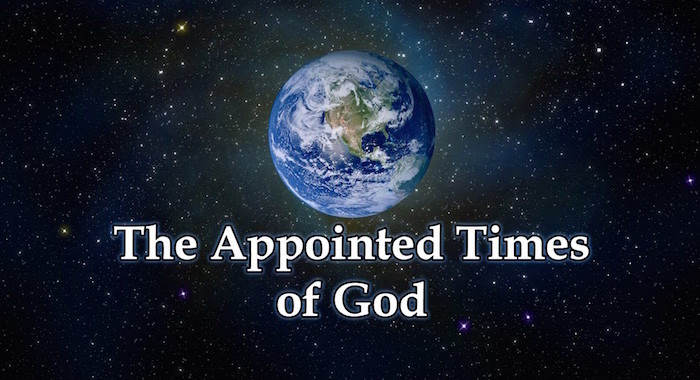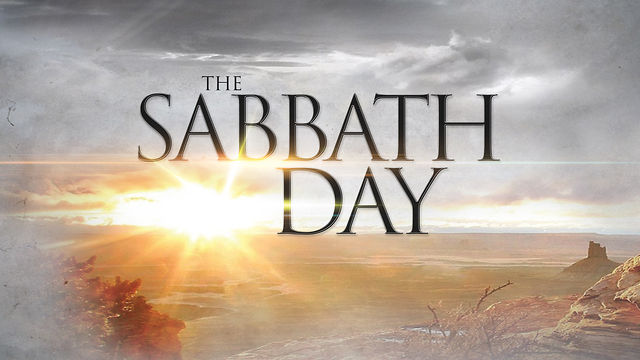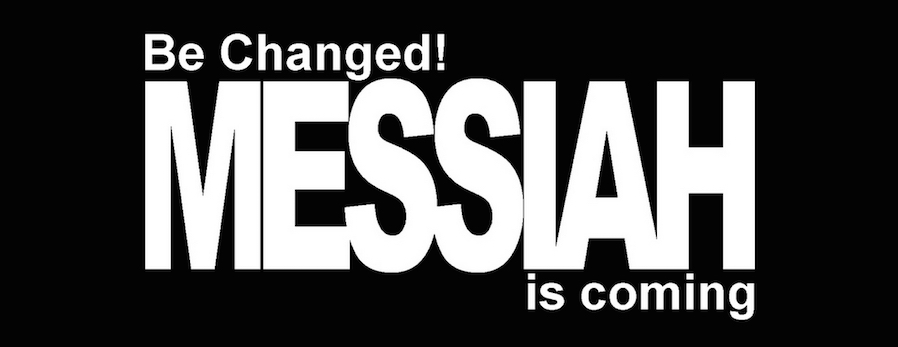From the very beginning we read in the book of Genesis that God established the heavens and earth with order and for a purpose. On the fourth day of creation God created the lights that were to separate the day from the night. The sun and moon were created and God said that these lights had a purpose beyond just giving light. God said, “and let them be for signs, and for seasons, and for days and for years;” (Gen. 1:14).
The word for “seasons” in this verse is the Hebrew word “moedim – מועדים.” The word “moed” or “moedim” (the singular and plural form respectively) means appointed time, date, or religious festival. In the context of Genesis chapter one, in reference to the creation, this word could be translated as seasons but it could also be translated as appointed times. What are the appointed times?
This week’s Torah Portion reading contains a whole chapter dedicated to the “appointed times” of God. Leviticus chapter 23 begins this way: “The LORD spoke again to Moses, saying, Speak to the sons of Israel, and say to them, ‘The LORD’s appointed times which you shall proclaim as holy convocations – My appointed times are these:” (Lev. 23:1-2) And then God explained to Moses these “appointed times.”
The Appointed Times of God
These appointed times of God are part of the Jewish calendar today as religious holidays. These religious holidays have significance individually and corporately. I believe that these appointed times of God have a past, a present, and a future and it is in everyone’s best interest to understand these appointed times of God. I will share these appointed times in a list so as to make them easy to navigate.
- The Sabbath (Lev. 23:3): The Sabbath is the first of the appointed times of God. The Sabbath is the first because it is the foundation for all other appointed times. The Sabbath is a day of complete rest. The word “shabbat – שבת” actually means to cease. Just as God ceased from his labors and rested on the seventh day, we honor God by ceasing from our labors and rest as we imitate God (Gen. 2:1-3). We rest and remember the creation account as God Himself rested. The other appointed times of God generally have a day of rest (a Sabbath day) in the observation of them. It is important to note that a “Sabbath” is both a weekly day of rest and a day of rest for any other appointed time (holiday).
- Passover and The Feast of Unleavened Bread (Lev. 23:4-8): The Passover was originally celebrated with the sacrificial lamb, bitter herbs, and eating matza bread for one week beginning on the 14th day of Nisan at evening. God delivered the children of Israel from being slaves in Egypt through the last great plague, The Passover. We remember the redemption of God in the days of Moses and how Yeshua was the final Passover sacrifice which redeemed us from the slavery of our sin. The Passover was celebrated with unleavened bread as Yeshua was sinless in His body. Today we also celebrate our freedom by living a life free from the leaven of sin (1 Corinthians 5:7-8).
- The Wave Offering of the First Fruits – the Omer (Lev. 23:9-14): This appointed time of God is often overlooked in Christian circles, however, it is prominent in Judaism, even today. God gave a special appointed day which was a day to bring the first fruits of the grain offering to the priest who in turn was to wave it before the LORD. A sacrifice accompanied this grain offering and marked the time when the people living in the Land of Israel could begin to eat the new harvest. The wave offering marked the beginning of a new season for the people to eat the new harvested grain for the year. We remember the faithfulness of God to provide life and sustenance for His people. Beyond the physical reality of the season of the new grain we acknowledge that on this same day was the resurrection of Yeshua from the dead, the first fruits from the grave and our hope of resurrection (1 Corinthians 15:20-23).
The Complexity of the Day of “The Wave Offering”
Of all the appointed times of God, this one is the most disputed regarding how to determine the day which God intended. The Scriptures clearly read that the wave offering is to be offered on the day after the Sabbath (Lev. 23:11). It is clearly in the context of the Passover week, however, there is a discrepancy over whether the “Sabbath day” mentioned is the day of Passover, which is a Sabbath day (meaning a day of rest) or the actual Sabbath day of Passover, meaning the seventh day of the week during Passover week. Since Passover falls on a different day of the week each year the day after Passover will also be a different day of the week. However, if the “Sabbath day” is simply the regular Sabbath day than it will always be a Sunday, or the first day of the week during Passover week.
Even in the days of Yeshua this issue was hotly debated. The Pharisees held to the day after the first day of Passover for the wave offering whereas the Sadducees held to the literal day of the Sabbath and counted Sunday as the day for the wave offering. Since the Scriptures tells us that Yeshua was raised on the first day of the week it seems clear that God intended Sunday to be the day that the wave offering was to be offered. Yeshua became the first fruits from the grave! (Matt. 28:1-6)
4. The Feast of Weeks or Shavuot (Lev. 23:15-21): This appointed time of God was counted from the wave offering. So the date of the Feast of Weeks is dependent on the wave offering by counting seven weeks from the day of the Wave Offering. The Feast of weeks is also celebrated with a Sabbath day (a day of rest) but would always be on a Sunday, if you count using the Sadducees’ method. However, orthodox Judaism today follows the Pharisaical rendering.
The Feast of Weeks is similar to the wave offering as it is a celebration of the new grain, which is like the first fruits. At this celebration the people living in the Land were to bring loaves of bread made with yeast along with sacrifices. This celebration is also a reminder of God’s faithfulness for a full harvest at its proper time. Religious Jews also celebrate the giving of the Law at Sinai at this appointed time, which corresponds to the time frame mentioned in the giving of the Law (Ex. 19:1). More importantly, the Feast of Weeks (also known as Pentecost) is the day when God sent His Holy Spirit to the believers in Jerusalem (Acts 2:1-4). The Holy Spirit is given to us who believe to remind us that the full harvest is coming, the day when we will be redeemed (Rom. 8:23).
5. The Feast of Trumpets (Lev. 23:23-25): The Feast of Trumpets is a unique appointed time of God as nothing is identified with this special day except for the blowing of trumpets or shofars. It is to be celebrated as a complete day of rest on the first day of the seventh month. In contemplating the significance of this appointed time, I believe God is reminding us to rest in Him for the victory. When God sent Joshua and the children of Israel against the city of Jericho it was not with the most modern technology or some strategic military tactic but rather with the ark of God and with trumpets. When the priest of God blew the trumpets on the seventh day God brought down the defense of the city of Jericho, the walls fell down, and they conquered the city (Joshua 6:1-21). The Feast of Trumpets reminds us of the power of Almighty God when circumstances seem to be against us.
We are also to remember the future coming of the Messiah and the judgment of the world that will occur after the seven trumpet blasts (Rev. 11:15-19). The trumpet blast is the sound that reminds us that we have an Almighty God that will come to judge this world and redeem His children.
6. The Day of Atonement – Yom Kippur (Lev. 23:26-32): On this appointed day, ten days after the feast of trumpets, atonement was to be made for all the people. It was to be a Sabbath day of complete rest. We are to rest and remember that God atones for our sins through the sacrifice that He demands. Today, at the very end of the Day of Atonement, a long trumpet blast is sounded. This should remind us of the redemption at the last trumpet when Yeshua returns (1 Corinthians 15:50-53).
7. The Feast of Booths – Sukkot (Lev. 23:33-43): This appointed time is a week long celebration beginning on the 15th day of the seventh month where God Himself commands His people to rejoice before Him (Lev. 23:40). The Feast of Booths is a week of living in temporary shelters to remember that God had the Israelites live in booths (temporary shelters) when they came out of Egypt (Lev. 23:43). We are to remember how God provided for the Israelites and how He still provides for us today. The Feast of Booths is unique among the appointed times of God as it is the only appointed time that is mentioned in the millennial reign of the Messiah (Zech.14:16). It is an appointed time with a definite future.
The Sabbath & God’s Appointed Times
Why is there generally a day of rest associated with the appointed times of God? Every appointed time of God, except for the Wave Offering, contains a command to have at least one day of rest. Why? It seems like the most obvious answer is to be like God, to cease from our own works, and to trust in Him. Ceasing to work is a step of faith.
To work at the right time is godly and to stop at the right time is godly. As a universal general principle, to work six days a week and to rest one day is an act of obedience and faith. Anything else is laziness or godlessness. To take a day off and to remember what God has done and will do is also an act of faith. We honor God through obedience to his voice.
The Intent of God’s Appointed Times
The seven appointed times mentioned above are all connected to the redemption of the children of Israel from Egypt, beginning with Passover and ending with the Feast of Booths (Lev. 23:43). Except for the Sabbath day, which is a weekly appointed time, the other six appointed times fall into either spring or fall feasts and are tied to one another for that season. Passover, The Wave Offering, and The Feast of Weeks are three appointed times which are all connected by time and season. The Feast of Trumpets, The Day of Atonement, and The Feast of Booths are also three appointed times that are connected by time and a season. Altogether, including the Sabbath, they are connected to the redemption from Egypt and to the fulfillment of God’s plan to bring His salvation to mankind through His Son Yeshua.
- The Sabbath: God gave the Israelites rest from their labors in Egypt and commanded them to keep the Sabbath. God also gives us spiritual rest in Yeshua.
Spring Feasts
- The Passover and Feast of Unleavened Bread: God delivered the Israelites from being slaves in Egypt and brought them into the Promised Land. Yeshua was the Passover Lamb.
- The Wave Offering of the First Fruits: The Wave Offering is part of Passover week. We remember the faithfulness of God to provide life and sustenance for His people in the dessert and also in the Promised Land. Yeshua rose from the grave on the first day of the Wave Offering.
- The Feast of Weeks (Shavuot): This appointed time is also connected to Passover being seven weeks after the Wave Offering. We remember God’s faithfulness to provide for His people at the proper time. We also remember the giving of the Law at Sinai after the Israelites came out of Egypt. The Holy Spirit was given at the Feast of Weeks.
Fall Feasts
- The Feast of Trumpets: There is no direct connection to Egypt, however, the children of Israel entered into the Promised Land and conquered the city of Jericho by the blowing of the trumpets. Yeshua’s return will be accompanied by the sound of trumpets.
- The Day of Atonement (Yom Kippur): The Day of Atonement is also not directly connected to the redemption from Egypt, however, complete atonement was made for both Jew and Gentile at Passover on the day Yeshua was crucified. All who believe in Yeshua are welcome to be set free from their personal bondage. Great atonement will also be made when Yeshua returns (Zech. 12:10-14. 13:1).
- The Feast of Booths (Sukkot): We are to remember that God made the Israelites dwell in booths in the dessert when they came out of Egypt and how God provided for them. The Feasts of Booths will continue to be celebrated after Yeshua returns.
All the holidays teach us that we must cease our striving and trust in God. They teach us that God alone provides atonement and gives us all that we need, just like He did for the Israelites in redeeming them from Egypt and bringing them into the Promised Land.
In the above rendering of the Appointed Times, they are divided into the spring and fall feasts. As Yeshua directly fulfilled the spring feasts at His first coming, it is very likely that He will fulfill the fall feasts at His second coming.
For God, who said, “Let light shine out of darkness,”
has shone in our hearts
to give the light of the knowledge of the glory of God
in the face of Yeshua the Messiah.
– 2 Corinthians 4:6-
Let us be sons and daughters of the light and be ready for the coming of our Messiah (1 Thessalonians 5:4-5)! We may not know the exact day and hour but we should understand God’s Appointed Times and understand the times and the seasons. Messiah is Coming!
Shabbat Shalom!
If you enjoyed reading this article, we invite you to sign up for our weekly Torah Portion commentary on the sidebar to the right.
Torah Portion: Lev. 21:1 – Lev. 24:23
Hafatara: Ezekiel 44:15-31
Return to Torah Portion Homepage
Copyright Jewels of Judaism. All rights reserved 2019




Daniel, Didn’t you recently post about how Jesus fulfilled Yom Kippur when He died ? If that’s so how is It that He fulfilled the spring Feasts and not the fall Feasts? I know Zachariah spoke about Tabernacles in the millennial, do you know why that is? Thanks,
Hi Rose, Yes, I did write an article on Yom Kippur recently. The article is called “The Chosen Goat”
You have asked a good question and there is no short answer. I would suggest taking my course on the Biblical Calendar.
Hey Daniel,
Good insight! I had a bit of an “Aha” moment in reading about the Sabbath. We have been talking much about what it means to be created in the image of God: we have dignity, destiny, and freedom. Through the Messiah, Gods image in us is redeemed and it is His goal that we become “conformed” to His image, and this is happening through the sanctification process (2 Cor 3:18) and it is our ultimate predetermined destination as believers (Rom 8:29).
However, I never even considered that part of our being God’s image-bearers is observing the Sabbath, just as God Himself did. This is one of the ways man has distorted His image-by not keeping the Sabbath holy as we have been commanded. So, thank you for this insight.
It is also very interesting to understand that Jesus fulfilled the spring feasts in his first coming, and likely will fulfill the fall feasts in his second coming.
Keep up the good work! 🙂
Grace and peace,
Thom
Hi Thom,
It thrills me to hear how others, like yourself, are benefitting from these short commentaries.
Thanks for the encouragement and let us strive to let the holiness of who God is shine through all that we say and do!
Peace,
Daniel
Dear Daniel,
Thank you for todays commentary on the appointed times. The commentary on The Feast of Trumpets, Romans 8:23 and 1Thessalonians 5:4 is a blessing.
Thanks,
Cindy
Dear Cindy,
I appreciate your comments. God bless you and Shabbat Shalom!
Daniel